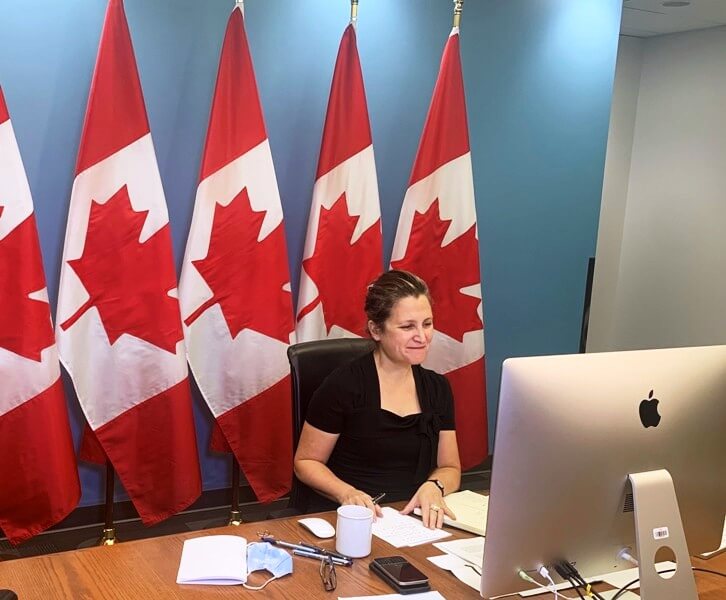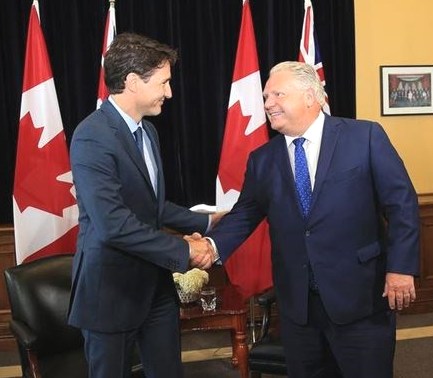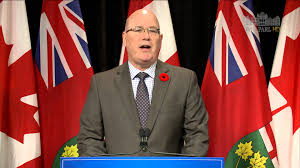
Government delivering a tax break for all Canadians and cracking down on short-term rentals
The Voice of Canada News
Chrystia Freeland, Deputy Prime Minister and Minister of Finance, and Jean-Yves Duclos, Minister of Public Services and Procurement and Quebec Lieutenant, highlighted how the government is putting more money in your pocket.

First, the Deputy Prime Minister and Minister of Finance highlighted that Bill C-78, the Tax Break for All Canadians Act, has been adopted by the House of Commons. The Bill is now before the Senate, and one step closer to HST/GST being exempt on essentially all food and many holiday essentials, giving Canadians real relief at the cash register.
Starting December 14, and until February 15, 2025, the following items will be tax-free:
- Prepared foods, including vegetable trays, pre-made meals and salads, and sandwiches;
- Restaurant meals, whether dine-in, takeout, or delivery;
- Snacks, including chips, candy, and granola bars;
- Beer, wine, and cider;
- Pre-mixed alcoholic beverages of not more than 7 per cent ABV;
- Children’s clothing and footwear, car seats, and diapers;
- Children’s toys, such as board games, dolls, and video game consoles;
- Books, print newspapers, and puzzles for all ages; and,
- Christmas trees and similar decorative trees.
By providing a tax break for all Canadians, the government is making essentially all food tax-free, which will put between $100 and $300 more in workers pockets on a basket of $2,000 in purchases over the next two months.

Second, the Ministers announced the launch of the new $50 million Short-Term Rental Enforcement Fund. The launch of the Short-Term Rental Enforcement Fund means municipalities will have the tools they need to ensure compliance with their existing short-term rental regulations, to ensure homes remain available for Canadians to live in.
Specifically, the Short-Term Rental Enforcement Fund will deliver funding to municipalities to increase enforcement and compliance activities, such as hiring enforcement staff, managing complaints, and conducting inspections. Applications from municipalities for funding can be submitted between December 16, 2024, and January 24, 2025.
In total, there are an estimated 235,000 short-term rentals across Canada, many of which could serve as long-term housing options for Canadians who need a place to live. This fund will support municipalities in enforcing their short-term rental regulations, bringing the non-compliant units back to the long-term housing market, and helping preserve our existing housing supply.
All of this is part of our work to build a fairer Canada for every generation, where you can afford the things you need and save for the things you want, like buying a first home of your own.
Quotes
“Inflation is back down to 2 per cent and interest rates have been cut four times this year. However, the holiday season remains a time of high expenses for many Canadians families. With new tax relief on groceries and holiday expenses, we are reducing costs for Canadians when they need relief most. And our new Short-Term Rental Enforcement Fund will help cities with their important work to ensure our existing supply of housing is used for Canadians to live in, as part of our work to stabilize the price of housing.”– Chrystia Freeland, Deputy Prime Minister and Minister of Finance

“Although inflation is down and our economy is strong, the cost of living remains a challenge for many middle-class Canadians. That is why the federal government is introducing a two-month tax break on groceries and everyday essentials alongside a new Short-Term Rental Enforcement Fund to ensure homes remain available for Canadians to live in. Both of these measures are going to provide middle-class families the relief they need and deserve.”–The Honourable Jean-Yves Duclos, Minister of Public Services and Procurement and Quebec Lieutenant

“Through the Short-Term Rental Enforcement Fund, we will work with communities across the country to make sure that short-term rentals don’t contribute to Canada’s housing crisis. This is a significant step in our work to ensure that everyone has a safe and affordable place to call home.”– Sean Fraser, Minister of Housing, Infrastructure and Communities
Quick facts
- The federal government’s tax break for all Canadians would fully relieve the GST/HST on the supply or importation of qualifying goods for a period beginning on December 14, 2024, and ending on February 15, 2025. Further details on the qualifying goods are available here.
- A family spending $2,000 on qualifying goods, such as children’s clothing, shoes and toys, diapers, books, snacks for the house, or restaurant meals would pay $100 less GST over the two-month period.
- In provinces where the HST will also be removed from qualifying goods (Ontario, Newfoundland and Labrador, Nova Scotia, New Brunswick, and Prince Edward Island), further savings would be realized. In Ontario, a $2,000 basket of qualifying purchases could realize total HST savings of up to $260 over the two-month period.
- In the 2023 Fall Economic Statement, the federal government committed $50 million over three years, starting in 2024-25, for a new Short-Term Rental Enforcement Fund. In Budget 2024, the federal government reaffirmed its commitment to helping municipal governments and Indigenous communities enforce their existing restrictions on short-term rentals, discourage non-compliant short-term rental listings, and limit short‑term rentals that take away long‑term housing units from renters and homebuyers.
- The Short-Term Rental Enforcement Fund will deliver one-time grant funding through a call for proposals launching today. Applications can be submitted starting December 16, 2024, until January 24, 2025.
- Municipalities and Indigenous communities can apply and find more details on the Short-Term Rental Enforcement Fund on Housing, Infrastructure and Communities Canada’s webpage.
- To access funding, municipalities and Indigenous communities, and, by limited exception, provinces and territories, will need to have existing strict short-term rental regulatory regimes in place, which include at minimum:
- An existing principal residence requirement limiting short-term rentals to principal residences and a licensing system for short-term rental operators;
- An enforcement and compliance program for their short-term rental regulatory regime; and,
- One additional existing regulation from a list of measures that further restrict short-term rental activity in municipalities and communities.



